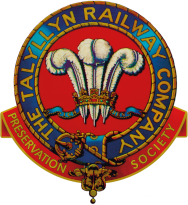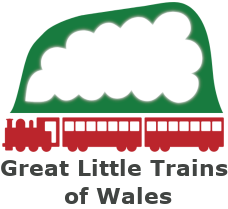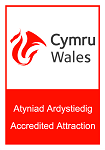MINUTES OF THE 55th ANNUAL GENERAL MEETING OF THE TALYLLYN RAILWAY PRESERVATION SOCIETY
Held at Neuadd Pendre Social Centre, Brook Street, Tywyn, Gwynedd on September 24th, 2005
On the platform were Christopher Awdry, President, in the Chair; Don Newing, Chairman TRPS; Keith Theobald, Chairman TR Co; Colin Roobottom, Hon. Treasurer, TRPS and Accountant, TR Co; John Robinson, Hon. Secretary, TRPS and Secretary, TR Co, and MRFS as Minute-taker. There were 202 members present. Christopher Awdry opened the meeting at 3.30p.m.
1. Apologies
Apologies had been received from Vice-President Dai Jones and 16 other members.
2. Minutes of the 54th AGM
The Minutes of the 54th AGM of the Society, held at Tywyn on September 25th, 2004, having been circulated to members of the Society at that date, were proposed by Christopher Awdry to be taken as read; this was agreed without dissent and he duly signed the minutes as being a true record.
3. Matters arising from the Minutes
There were none.
4. Election of President
Don Newing took the Chair and asked the meeting to endorse the Council’s nomination of Christopher Awdry as President. This was agreed with a large majority showing assent.
5. Election of Vice-Presidents
Christopher Awdry resumed the chair and asked John Robinson to read out the names of those proposed for election as Vice-President, explaining that a letter had been received requesting that the votes for each Vice-President be taken individually. MRFS disagreed, proposing that the Vice-Presidents should be voted for en bloc as in previous years, this was seconded by Ian Lloyd-Owen. John Robinson felt that the request for individual elections should be accepted as this was standard procedure. MRFS’ proposal was withdrawn. Ian Lloyd-Owen vehemently disagreed, feeling that a proposal from a member attending the meeting carried equal validity to a letter. After checking the constitution John Robinson reported that the method of election for Vice-Presidents was not specified. Ian Lloyd-Owen resubmitted the original proposal, this was seconded by MRFS and carried, eight members voting against. Christopher Awdry read out the names and asked the floor to elect the Vice-Presidents en bloc. The following were elected with five votes against: Peter Austin, John Bate, James Boyd, Philip Care, Alan Holmes, Richard Hope OBE, Dai Jones, Winston McCanna, Major P M Olver OBE, Sonia Rolt, Roy Smith, Don Southgate, Jeremy Wilkinson and Maurice Wilson.
6. Appointment of Auditors
After thanking Peter Silver, Christopher Awdry sought nominations for Auditors. The re-appointment of Silver & Co was proposed by Bob Cambridge, seconded by Richard Hope and agreed by the meeting. Peter Silver thanked the meeting for re-appointing his firm.
7. Election of Honorary Treasurer
Christopher Awdry asked Garry Mumford to join the platform party. He had been nominated in accordance with the rules, this was seconded by Richard Hope and agreed without dissent.
8. Election of eight members of Council
John Robinson read out the names of the nine candidates and they stood to be recognized. The ballot papers were then collected. Later in the meeting Peter Silver announced the results of the election: 222 papers had been returned, 1,339 votes being cast as follows: Jane Garvey 162, Simon Jenkins 151, Ian Lloyd-Owen 130, Jonathan Mann 147, David Mitchell 141, Don Newing 142, Rob Plumridge 161, Chris Price 165, Noel Williams 140. Mrs Garvey and Messrs Jenkins, Mann, Mitchell, Newing, Plumridge, Price and Williams were declared elected. Permission was given to destroy the papers in the traditional manner.
9. Reception, Approval and Adoption of Reports
Don Newing presented the report of Council for the year ended 31st January, 2005 and gave an update on the situation, noting that he would leave Wharf redevelopment largely to Peter Austin. However, the major event of the year had been the opening of the new Wharf building, which was now fully in service. He thanked all those involved in the Wharf redevelopment and those that had carried on behind the scenes running the trains. He extended his thanks to the Tracksiders, Navvies and Young Members’ Group for making the Railway a big happy family; this was a credit to all involved in “keeping the succession going”. Don then presented the trading position to date, noting that the new Wharf building was indeed a new front door, but with only a partial year of use. Passenger journeys were up 5.4% at 85,926 and bookings were 40,717 (+8.3%) of which members accounted for 5,228 (-10.8%); Catering takings from the public at Wharf were £62,805 (+80%) and at Abergynolwyn £60,476 (+9.8%) whilst those from volunteers were £13,415 (-10.6%); Shop receipts at Wharf were £101,624 (+8.0%) and at Abergynolwyn £13,075 (+3.8%).
Colin Roobottom presented the Financial Statements, reporting that the major item of the current financial year was Wharf Redevelopment, whose final details would be in next year’s accounts. He commented that the price of coal had increased by some 50% due to the booming Chinese economy and that the running costs had increased at Wharf but it was too soon to have useful information. He said that during the redevelopment it had been very tricky to keep the bank accounts in the black and he was very grateful for substantial short-term interest-free loans from members.
Christopher Awdry invited questions on the reports.
Ian Lloyd-Owen precised a document, written by others, calling for a formal review of all trading aspects of the Railway to be presented to the membership within six months, with a five-year business plan. He asseverated that this request was not to be seen as a threat to the Railway, and proposed its adoption, seconded by David Nash. David Mitchell welcomed the proposal but would prefer slightly longer timescales as this would not be entirely a financial matter; the Railway was run for the members, many of whom wished to retain its slightly extravagant and laid-back approach: commercial attitudes could be found further North. Chris Price felt quite strongly that what made the Talyllyn “special” was not the way the it was run but first and foremost the people involved. He commented that the Railway was perceived to be run secretly and that no long-term harm could come from adopting a more business-like approach.
Richard Hope commented that after a previous business plan, based on a 1% annual increase in passenger journeys, they actually fell by 40%. Gerald Grudgings warned against the creation of a mountain of paperwork to the detriment of practical tasks. Ian Lloyd-Owen retorted that computerized management accounts would not go into a paperchase, and reiterated that the members were the guardians of the Railway, the caretakers of a preservation society. David Nash stated that this proposal would create tighter financial controls and enhance the generation of spare revenue; it would not create major change, just secure the future. Colin Wroblewski welcomed the proposal, stating that members would not knowingly vote for a loss in the future, he approved of management accounts with an element of forecasting.
Ian Hopwood suggested changing the timescale to ten months, allowing the members to read the business plan before the next AGM. Ian Lloyd-Owen concurred and resubmitted the proposal with the longer timescale; it was seconded by Russell Prince and accepted by the meeting.
There being no further questions, Sue Whitehouse proposed the adoption of the Report of Council and the Financial Statements of the Society for the year ended 31st January, 2005; this was seconded by Richard Hope and agreed without dissent.
10. Wharf Redevelopment.
Peter Austin began by thanking the members for electing him as a Vice-President; he was deeply honoured by this prestigious award and pleased that he was still working and alive to receive it. Peter explained that the outstanding work was principally “snagging” in conjunction with the contractors and the completion of some small items in the museum. The total cost of the project would amount to £1,520,000; this sum represented a total cost overrun of about £130,000 or 9.15%. However, the challenges had included poor substrate conditions, additional piling for the wall against Neptune Road, construction overruns, extra fire-proofing of ceilings and extra expenditure in the shop, café and museum; the total also included unbudgeted items like fitting out the offices, disposal of the portacafé and the general Wharf yard clean-up. Peter thanked the Heritage Lottery Fund, the Wales Tourist Board, the Welsh Development Agency, the Welsh Assembly Government and the Council for Museums in Wales for the grant funding of this second phase of the Wharf redevelopment project; the many members and friends whose generous donations had contributed a total of over £500,000; the members of the small project committee and all the volunteers and employees, far too numerous to mention individually, for their advice, assistance and work in addition to their usual duties; and finally his wife, Margaret, for her forbearance over yet another lonely year. Peter closed his report by reiterating that deciding who was to be invited to the Royal opening was not easy with the constraints on numbers and the security considerations, exacerbated by the events in London on 7th July, just six days before. Of course we would have liked all 3,500 Society members to be present, but this could not be; on behalf of those responsible for the selection and invitations, he apologized for the final time if any felt left out: this was partly outwith the Railway’s control.
At the end of this item Elisabeth Mann appealed in aid of the Abergynolwyn playground. Passenger response had been good, but there was a need to maintain interest levels with new equipment. A collection was then taken which raised £931 (including the anticipated tax refund under the Gift Aid scheme).
11. Locomotive Livery Policy.
Simon Jenkins read out a short letter, greeted with much groaning, from the absent Mike Davies who thanked contributors to the discussion that had resulted from last year’s meeting, but felt that precious few had addressed the crux of the matter, the means of deciding liveries, preferring to advance personal suggestions for colour schemes. Furthermore, he had asked for summaries of the proposals, prior to publication, from Don Newing and sought clarification why he had received no reply. Don Newing apologized for being unable to reply, due to the pressure of organizing the grand opening of Wharf. Don then proceeded to explain that the relevant information from p.38 of the September Talyllyn News had been reprinted and widely distributed in the hall to correct “… any single proposal achieving less …” in paragraph three of the preamble to “… no single proposal achieving more …” and to replace “designated” in proposal C by “to be available”. Chris Price felt that debate was pointless as most had already voted. A show of hands, instigated by Murray Dods, showed that a few had not. Ian Hopwood felt the Railway should make the most of what it had by painting No. 1 Talyllyn as Skarloey and turning out the vintage set in blue and cream. Ian Lloyd-Owen responded emphatically; feeling the engines looked good as they were, he also spoke in favour of proposal E. Dale Coton warned those present to vote carefully, retaining freedom for potential marketing opportunities. Chris Price, noting the absence of Ian Howitt, pointed out his indifference. Sue Whitehouse expressed her hope of seeing voters in the paintshop in winters to come. David Mitchell thought that voting for proposal E would add venom to an already poisoned chalice. Ian Evans wondered if the proposals referred to steam locomotives, diesels or both. Don Newing pointed out that they covered both. MRFS ejaculated “ludicrous” in response.
The ballot papers were collected and after a lengthy counting process Peter Silver announced that 217 had been returned of which 16 were spoilt. The results were: first round: A19, B 86, C 37, D 10, E?49; second round: A 20, B 89, C 41, E 51; third round: B 94, C 45, E 53; fourth round: B 102, E 66. Therefore proposal B was declared adopted.
12. Membership Subscriptions
Don Newing presented the proposal of the Council that membership subscriptions should be: Life Member £500; Ordinary £23; Senior £18; Junior £12; Associate Life £250; Associate £12; Associate Junior £6. Russell Prince felt that this proposal should be rejected as the membership travel survey had shown the proportion of members travelling was falling. Chris Price disagreed, commenting that he would vote with a slight air of disappointment that the basic rates had not been doubled. Andy Lawton wondered how much it cost to service the membership; did subscriptions reflect the cost of printing and distributing the magazines? Lawrence Garvey responded that it was about a third of the subscription income. Chris Price proposed an amendment to: Ordinary Member £25; Senior £20; Junior £15; Associate £15. Simon Jenkins felt that these rates bore too heavily on families and suggested the Associate Member rate should be £10 and Associate Junior £5. Chris resubmitted his amendment with these changes and this was seconded by Simon.
Ian Lloyd-Owen stated that he would support any proposed increase in subscriptions, but wondered how often they were reviewed. John Robinson replied that the rates were examined every year or two by the February meeting of the Finance & General Purposes Committee, commenting that a compromise was necessary as small annual increases were the least painful way to keep up with inflation but each change made a lot of work for the Membership Secretaries. Ivor Moody vehemently asserted that it was invidious that those who were better off financially than pensioners on fixed incomes could set the Senior Member subscription rate.
Chris White proposed that the amendment be now put; after attempting to explain procedural motions, with a cry of “Sod the technicalities”, Don Newing called a vote on Chris Price’s amendment, which was passed by a large majority. Don then put the amended proposal that membership subscriptions should be: Life Member £500; Ordinary £25; Senior £20; Junior £15; Associate Life £250; Associate £10; Associate Junior £5; which was also carried by a large majority.
David Williamson queried the suitability of dogs for membership. Jane Garvey replied that dogs were charged the Associate Junior rate, and that the Membership Secretaries used their discretion in processing applications. David felt that it was barking mad that dogs could become members, he would prefer to see an annual season ticket for them. He proposed, seconded by Bob Hey, that non-human beings be barred from membership of the Society. Andy Statham stated that he was proud that his dog was a member. Michael Howard spoke at length to the effect that there were more important things to worry about and urged the rejection of this proposal. Gerry Young wryly commented that the proposal could have been voted on in less time than it took Michael to speak. Sue Whitehouse chided the meeting, commenting on the good publicity value of dog membership. Chris Awdry put the proposal to the meeting and it was defeated with only 4 votes in favour.
13. Miscellaneous announcements
Bob Hey announced the result of the Traffic & Operating Committee election. 117 papers had been returned and 386 votes cast with the following result: Traffic Department: Walter Crowe 107, Lawrence Garvey 53, Pippa McCanna 87, MRFS 98, Alastair Ribbands 41; Locomotive Department: Martin Fuller, Bill Heynes, Phil Higginson and Andrew Young had been the only nominees for four places so there was no poll. He declared Miss McCanna and Messrs Crowe, Fuller, Garvey, Heynes, Higginson, MRFS and Young elected.
Philip Sayersannounced the results of the Young Members’ Group election: 31 ballot papers had been issued of which one had been spoilt and one not returned; 141 votes had been cast as follows: Paul Cottrell 22, Neil Jones 18, David Martin 14, Andrew Robinson 18, Deborah Sharpe 12, Rebecca Sharpe 21, Andrew Vick 26, Tim Wroblewski 10. He declared Miss R. Sharpe and Messrs Cottrell, Jones, Robinson and Vick elected.
Simon Jenkins drew attention to the entertainment which would enliven the hall that evening.
Jane Garvey plugged the Midland Area Group Christmas dinner, which would be held on the 6th December at the Birmingham Repertory Theatre. Lawrence Garvey appealed for help at the Warley Model Railway Exhibition to be held at the National Exhibition Centre over the preceding weekend.
Phil Glazebrook advertised ‘Steampipes’, which would be held on 7th December at the Friends’ Meeting House near Euston Station, the London Area Group Annual Business Meeting on 18th October (a day later than shown in the News) and its Christmas Dinner on 5th December.
Tony Thorpe advised members that the East Midlands Area Group Christmas Dinner would be held on the third Thursday of January.
Keith Theobald reminded members that Outdoor Weeks were advertised in the Talyllyn News. As always additional volunteers would be warmly welcomed and work would be available to suit everyone. Keith then expressed the gratitude of the whole Society to Colin Roobottom for his stalwart services as Honorary Treasurer for the last forty years, and after the applause Bob Morland presented him with a copy of his new book, The Talyllyn Railway in Colour, as a thank-you from the working members.
Phil Higginson drew the winning name for the News competition for a copy of the same book with a flourish and stating “You’re going to love this” announced that the winner was Mike Davies.
Sue Whitehouse spoke about her sponsored walk: the fund hit £3,000 two days before her fiftieth birthday and with a great sense of pride she presented a cheque for £1,000 to Talyllyn Holdings.
14. Other Business
Peter Stowell, of the Puffing Billy, conveyed greetings from our twin and offered congratulations on the new museum and other facilities at Wharf.
David Leech was invited to introduce Gordon Rhodes, and having inveigled him to the meeting for the first time in many years and enticed him on to the platform, by some byways reached a statement that Gordon had developed an affinity with a certain item of Railway equipment which had resulted in a close encounter on 6th July, 1968; now released by the redevelopment, the former bufferstop beam from Wharf was brought on to the stage and presented. Gordon was uncharacteristically dumbfounded but thanked those present and requested that the timber be disposed of “in the traditional manner”.
There being no further business Christopher Awdry declared close of play at 17.38.








